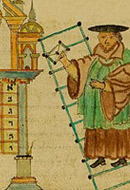Rabbinic Literature
 The Bible and the Good Life
The Bible and the Good LifeThursday, July 14, 2011 by Aryeh Tepper | Jewish Ideas Daily » Daily Features
What manner of work is the Hebrew Bible? The 17th-century freethinker Baruch (Benedict) Spinoza had an answer. As part of his war to emancipate philosophy from the influence of religion, he reduced the biblical message to, in effect, one word: obedience.
 The Reluctant Renegade
The Reluctant RenegadeTuesday, July 12, 2011 by Elliot Jager | Jewish Ideas Daily » Daily Features
Since its founding, Conservative Judaism in the U.S. has defined itself in sharp contrast to Reform, pursuing a more religiously centrist and Zionist middle course. Its UK parallel, Masorti ("traditional") Judaism, was born as a secession movement from Orthodoxy—inspired by theologian Louis Jacobs.
 What is Aggadah, and How to Read It
What is Aggadah, and How to Read ItThursday, July 7, 2011 by Elli Fischer | Jewish Ideas Daily » Daily Features
Although the Talmud is best known for its discourse on religious law, its pages contain a vast amount of non-legal material, including ethical teachings, interpretations of biblical narratives (midrash), and excurses on topics from brain surgery to dream interpretation.
 Capital Crime. Capital Punishment?
Capital Crime. Capital Punishment?Tuesday, July 5, 2011 by Aryeh Tepper | Jewish Ideas Daily » Daily Features
Since its founding, the only person ever to be executed by the state of Israel has been the notorious Nazi, Adolf Eichmann. But the brutal murders of Udi and Ruth Fogel and three of their young children this past March has the IDF weighing the possibility of seeking the death penalty for the Fogels' murderers.
 Israelites in the Anglo-Saxon Sea
Israelites in the Anglo-Saxon SeaFriday, June 17, 2011 by David Curzon | Jewish Ideas Daily » Daily Features
Since it was first composed, there have been dozens—if not hundreds—of renderings of the Hebrew Bible. The process of translation and creative elaboration began during the first millennium B.C.E.
 Jesus for Jews
Jesus for JewsWednesday, June 15, 2011 by Eve Levavi Feinstein | Jewish Ideas Daily » Daily Features
That Jesus lived and died a Jew would hardly be regarded as news by most educated Jews and Christians today. Still, while the historical Jesus is ever-elusive, the figure of Jesus, for Jews, has become more accessible.
 Sympathy for the Devil
Sympathy for the DevilMonday, May 23, 2011 by Allan Nadler | Jewish Ideas Daily » Daily Features
Occupying a place of particular infamy in Jewish collective memory is an 18th-century serial apostate, sexual deviant, messianic pretender, and chameleonic charlatan. His name was Jacob Frank.
 The Life of Prayer
The Life of PrayerTuesday, May 17, 2011 by Yehudah Mirsky | Jewish Ideas Daily » Daily Features
Prayer has never been easy, as the Psalmist well knew: "For there is no word on my tongue; You, O Lord, know them all" (139: 4). And even if there are words on the tongue, the results can be distressingly uncertain, or worse: "My God, I call out by day and You do not answer; by night, there is no respite for me" (22:2). It hasn’t gotten easier since then.
 Beyond “Religious” and “Secular”
Beyond “Religious” and “Secular”Wednesday, May 11, 2011 by Yehudah Mirsky | Jewish Ideas Daily » Daily Features
What should be the place of the Jewish religion in a Jewish state? There are many putative answers to this question, and the answers have changed over time. When Zionism was still an aspiration, a great blank yet to be filled in, the terms of debate were set by a self-confidently secular dispensation preoccupied with state- and institution-building. In the first few decades of statehood, religion, though state-established, was clearly subservient.
 Telling Jewish Time
Telling Jewish TimeMonday, April 11, 2011 by Allan Nadler | Jewish Ideas Daily » Daily Features
The most acclaimed Jewish Bible commentary opens with a question. Why, asks Rashi (1040–1105), does the Torah begin with the account of creation, when it should properly have begun with God's revelation of His very first law to Moses on the eve of the Exodus from Egypt: "This month shall be for you the first of months"?
Editors' Picks
The Patrilineal Predicament Naomi Zeveloff, Forward. Nearly three decades after the Reform movement's landmark decision to accept patrilineal Jews, statistics confirm that the worst fears of critics have come true.
The Rabbi Who Writes Too Much Gary Shapiro, Forward. Just how pronounced is the graphomania of Rabbi Eliezer Shlomo Schick? One professor found 954 titles by Schick in the catalog of the National Library of Israel—and those were just the ones in Hebrew.
Rabbinic Malpractice? Josh Yuter, Yutopia. Why did it take forty years for Orthodox Judaism to go from the "Lieberman Clause" to the strikingly similar "Halakhic Prenup"? It seems it was more concerned with delegitimizing Conservative Judaism than with addressing the agunah problem.
Translate Thy Enemy Jeremy Sharon, Jerusalem Post. A translation of the Talmud into Arabic seems motivated less by historical interest than by a desire to understand what is considered to be "the main source of Jewish iniquity."
Darwin and the Rabbis Michael Kay, Thinking through My Fingers. We're told that "religion" and "science" went head to head over evolution. But nineteenth-century rabbis, including Samson Raphael Hirsch, Hermann Adler, and Abraham Isaac Kook, were all willing to engage with Darwinism.
An Abundance of Haggadot Jewish Ideas Daily. Through the Haggadah, wrote the late Yosef Hayim Yerushalmi, "the memory of the nation is annually revived . . . and the collective hope sustained." Yet precisely that sense of the collective seems absent from many of today's Haggadot, even the best of them.
Crowdsourcing the Constitution Walter Russell Mead, Via Meadia. "We the People" indeed—a new commentary on the U.S. Constitution draws its inspiration from an unlikely source.
Amalek and Moral Ambiguity Gil Student, Torah Musings. While halakhically persuasive, a new study of the moral contradiction inherent in the commandment to wipe out the Amalekites is not emotionally sufficient.
Settling a Legacy Chaim Levinson, Yair Ettinger, Haaretz. As the settler movement is divided over whether to follow Zvi Yehuda Kook's theoretical refusal to cede land or his practical compromises, the young are gradually deserting religious Zionism for Hasidism.
Learning from Men Judith Hauptman, Jewish Studies Internet Journal. Were there women's voices in the ancient beit midrash? (PDF)

